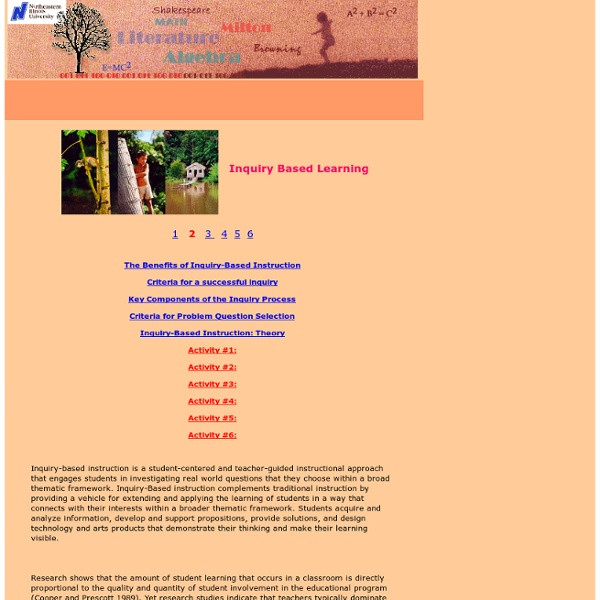



http://www.neiu.edu/~middle/Modules/science%20mods/amazon%20components/AmazonComponents2.html
Related: Inquiry-Based LearningInquiry-based learning Inquiry-based learning (also enquiry-based learning in British English)[1] starts by posing questions, problems or scenarios—rather than simply presenting established facts or portraying a smooth path to knowledge. The process is often assisted by a facilitator. Inquirers will identify and research issues and questions to develop their knowledge or solutions. What is PBL? To help teachers do PBL well, we created a comprehensive, research-based model for PBL — a "gold standard" to help teachers, schools, and organizations to measure, calibrate, and improve their practice. In Gold Standard PBL, projects are focused on student learning goals and include Essential Project Design Elements:
How to: Inquiry Will you ever just walk into class and ask, "Okay, what do you want to study today?" Of course not. Inquiry-based learning is founded on students taking the lead in their own learning, but it still requires considerable planning on your part. Don’t do inquiry No, I’m not trying reverse psychology here. I really don’t want you to do inquiry in your classroom. Seriously. 10. Inquiry is too loud and too messy
Inquiry-based Learning: Explanation What is inquiry-based learning? An old adage states: "Tell me and I forget, show me and I remember, involve me and I understand." The last part of this statement is the essence of inquiry-based learning, says our workshop author Joe Exline 1. Inquiry implies involvement that leads to understanding. Furthermore, involvement in learning implies possessing skills and attitudes that permit you to seek resolutions to questions and issues while you construct new knowledge. "Inquiry" is defined as "a seeking for truth, information, or knowledge -- seeking information by questioning."
What’s the Best Way to Practice Project Based Learning? By Peter Skillen Project Based Learning can mean different things to different people, and can be practiced in a variety of ways. For educators who want to dive in, the good news is that a rich trove of resources are available. In order to create your own definition and practice, here are some parameters to consider. This diagram, enhanced by the critical eye of Brenda Sherry, can help you figure out what’s important to you and your students. Fostering Inquiry-based Learning in Labs Using Google Spreadsheets Instructors in lab courses often find it difficult to simulate and discuss all phases of scientific inquiry during a single class period. For instance, individual lab groups may not be able to replicate experimental trials sufficiently in the time allotted, requiring instructors to compile data sets across lab groups before students can properly analyze and interpret results.Google Spreadsheets can circumvent this logistical barrier by allowing instructors to crowdsource the data aggregation and “cleaning” during class. For example, Chad Hershock and Rachel Niemer, CRLT, teach a short-course for postdocs on college teaching in science and engineering. During a unit on converting traditional, “cookbook” lab exercises into inquiry-based activities, postdocs work in pairs to complete a sample lab protocol. All the pairs then enter their data into a single Google Spreadsheet, so that the class compiles a robust class data set in real time, without any cutting and pasting across files.
Phases of inquiry-based learning: Definitions and the inquiry cycle The review of the 32 articles allowed us to generate an initial overview of the common phases across the articles and was the basis for proposing a comprehensive inquiry-based learning framework. It was decided that this synthesis would be limited to the articles found by the systematic search in order to avoid unsystematic collection of articles that would decrease the reliability of the study. First, we describe how we merged the variety of terms that were used to describe inquiry phases in the articles analyzed in this study. AEC394/WC075: What Is Inquiry-Based Instruction? Anna J. Warner and Brian E. Myers2 Introduction Educators should constantly evaluate and adjust their teaching approaches to meet the educational needs of their students and society.